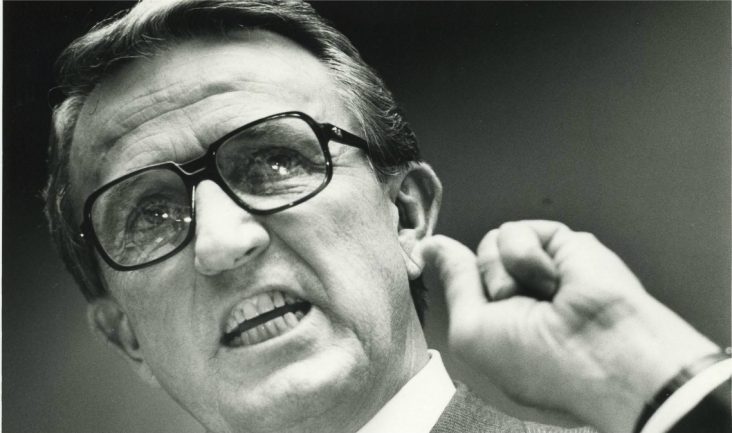Clinton: Bumpers ‘never stopped challenging us to think or to learn’
by January 10, 2016 5:41 pm 240 views

The late U.S. Sen. Dale Bumpers was memorialized Sunday (Jan. 10) at First United Methodist Church in Little Rock with speeches by President Bill Clinton and Sen. David Pryor, and with Govs. Asa Hutchinson, Mike Beebe, Mike Huckabee and Jim Guy Tucker in attendance.
Dale Leon Bumpers, a four-term U.S. Senator and two-term governor, passed away Jan. 1 at the age of 90 after a long illness. Bumpers, a self-described small-town lawyer from Charleston, Ark., rose to political prominence as a long-shot candidate for governor in the 1970 campaign defeating the Faubus political machine and ushering in an era of sweeping governmental and tax reforms. In the U.S. Senate, he defeated powerful incumbent U.S. Sen. J. William Fulbright, one of the most influential voices in 20th century American international relations.
Bumpers’ ashes will be buried in his hometown of Charleston.
Clinton referred at length to Bumpers’ speech defending him at the 1999 impeachment trial in the U.S. Senate. He said Bumpers in his speech said he couldn’t defend his friend, but he would defend the Constitution.
“What was special about him is, he never wanted people to act on emotion alone,” Clinton said. “He never stopped challenging us to think or to learn. … He would tug at our heartstrings, and then he would ask us to think, and if we didn’t know something, he used humor so people would listen to him so he could impart information.”
Clinton said, “There were times I would have gone stark raving mad if he and David (Pryor) hadn’t been in Washington.”
Clinton said in December 1974 he met Bumpers and his wife, Betty, at the Governor’s Mansion and urged Bumpers to run for president because someone like him would be elected in 1976. Bumpers said the thought of running had crossed his mind, but he had only recently been elected to the Senate and owed the people of Arkansas his best effort. Another Southern governor, Jimmy Carter, instead was elected.
“If Dale Bumpers had run, he would have won the election,” Clinton said.
Clinton said the tax increases pushed by Bumpers as governor “made modern Arkansas possible” by providing money for education, enabling the state to weather the storm during the recent Great Recession, and even letting Hutchinson cut taxes, Clinton said.
Clinton said Bumpers was willing to take unpopular political stands, such as handing ownership of the Panama Canal to Panama. As senator, Bumpers was a social progressive but a fiscal conservative and one of only three senators to vote for President Reagan’s 1981 budget cuts but against his tax cuts, Clinton said.
“He was a great governor,” Clinton said. “He was a great senator. He was the finest orator of his day. But the most important thing he did was make things better and make people bigger.”
Pryor praised Bumpers as “one class act” with “raw and unrivaled confidence” and shared stories from his and Bumpers’ time in the Senate. Once, Sen. George Mitchell, the Senate majority leader, summoned Bumpers to his office, indicating it was an emergency. It turned out that Mitchell was concerned Bumpers was about to retire. Pryor told him he didn’t need to worry because Bumpers had two things he needed most: a podium and a parade every Saturday.
“He believed that speech should be not a speech,” Pryor said. “He believed that every speech should be a performance, and he believed it and he practiced it and he made it work. He used logic, and he used the power of words to make us think.”
Pryor said after Bumpers’ impeachment speech, the two were sitting in an IHOP restaurant when two waitresses clearly were looking in their direction. Pryor figured they were approaching to obtain Bumpers’ autograph. Instead, they asked which of the two had once been sheriff. (Link here for a recent Talk Business & Politics interview with Pryor about Bumpers.)
Longtime Arkansas journalist Ernie Dumas praised Bumpers’ character, saying Bumpers’ adored father taught him that politics is a noble profession. He said as governor Bumpers had issued a rule that his office, department heads and state employees would return all gifts. He said he worried every night that a state government employee was doing something unethical that would appear in the next morning’s newspaper, where his children would read about it.
He said Bumpers’ proudest achievement was persuading the Charleston School Board to integrate all its schools after the 1954 U.S. Supreme Court ruling in Brown v. Board of Education of Topeka. Charleston was the only district in the former Confederacy to integrate all its schools the year after the ruling.
